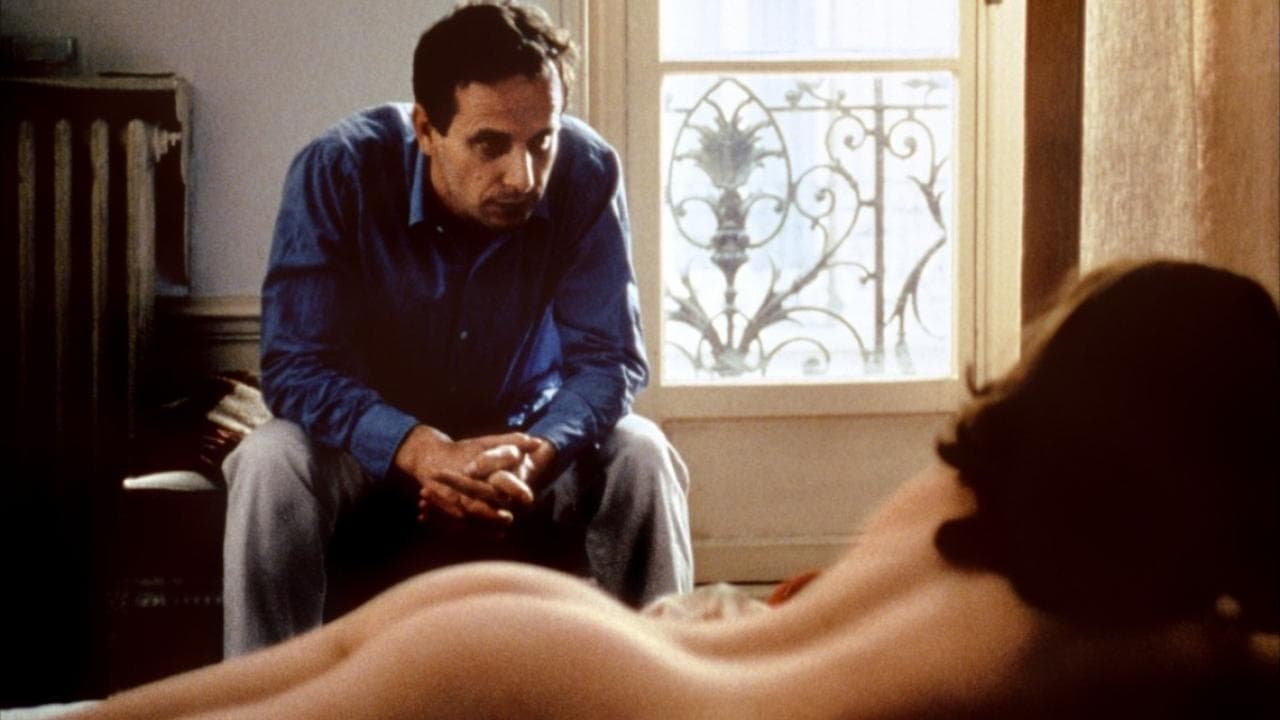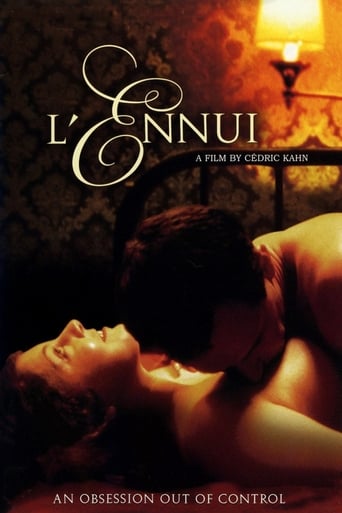Linbeymusol
Wonderful character development!
SeeQuant
Blending excellent reporting and strong storytelling, this is a disturbing film truly stranger than fiction
InformationRap
This is one of the few movies I've ever seen where the whole audience broke into spontaneous, loud applause a third of the way in.
Hadrina
The movie's neither hopeful in contrived ways, nor hopeless in different contrived ways. Somehow it manages to be wonderful
FilmCriticLalitRao
Cedric Kahn has directed this film based on a novel by Italian writer Alberto Moravia. It is generally said that making a film based on a book is a daunting task. This is precisely the case with this film. L'Ennui is a real oddball film. It is due to its diaphanous nature as no one is really sure what the real theme of this film is. If viewers decide to ruminate over the film's theme, they will have to choose from some weird options :tumultuous sexual escapades in the life of a failed writer, exploitation of a young girl and lastly gross neglect of her old parents by a young girl. The film also suffers from a fundamental flaw which consists of its characters' vacillatory stances. There is a writer who is facing emotional crisis and is not sure of what he is supposed to do. There is a young girl who allows herself to be exploited. Charles Berling is passable as the writer in question. He outlines his frustration through his anger. Sophie Guillemin is above average in a lackluster performance. Admirers of pleasure in films might want to check it out but they would be grossly disappointed by this film's lifeless scenes of physical love.
emanelle2000
Though I agree with burrobaggy that the film becomes irritating part way through, I have to say that this is exactly the point of it. We are forced to watch Berling's character become increasingly obsessed with Guillemin's, to the point where we are not only disturbed, but also completely perturbed by his inability to let go of Cecilia, who seems so wonderfully and completely uninterested and distant (something French actresses do best!). I admit that while I watched the movie, I had to turn it off part way through; I, myself, became so anxious by and annoyed with Martin's obsessiveness. At first, I thought it was because the movie was totally unappealing, even unwatchable. However, once I watched the rest of it and I realised that Kahn probably had every attention of making his subject so intense, so masochistic, and so repetitively annoying in his obsession, the utter irritation and anxiety that the movie provoked in me suggested that not only is the filmmaker very successful in representing pathological behaviour, but also in implicating his audience in that representation.
Bob Taylor
It's relentless: every question from Berling that calls for more than a yes or no is parried by Guillemin, which leads to exasperation, then to sexual excitement leading to another bout in the sack. "I don't know... never thought about it" becomes a suit of armor for the girl facing her maddened lover.There is a whimsical aspect to all this (thank God, too)--it's Arielle Dombasle's performance as the funny, sensible Sophie, a sort of aunt to Berling. She has all the wisdom that Berling needs but can't use. Cedric Kahn, who directed, seems to be a competent workman but no more. The Moravia novel on which the picture is based is a good airport novel, as Bertolucci said about The Conformist, but it's sometimes the airport book that can be turned into an effective film, as here.
Mort-31
Imagine a relationship divided into two parts: the smaller one is sex and the rest is talking – about sex, sex and love.Such is the relationship between Martin and Cécilia in this wonderful movie. I say wonderful because although this premise doesn't sound too entertaining throughout almost two hours, I was really amazed and didn't feel l'ennui – boredom at any phase of the film. Beyond the sex scenes (Sophie Guillemin looks really great, I must say…) and the endless interrogations Martin subjects Cécilia to, the action somehow unfolds and unfolds and in the end we know that we have not only seen a philosophical love film like `Before Sunrise' but a real STORY, a unified whole.Martin's character is precisely copied from real life by author Alberto Moravia and perfectly portrayed by Charles Berling. This kind of man, apparently philosophical, but actually egocentric, possessive and concerned only about himself, is in my opinion the only realistic modern kind of man who is worth building a fictitious story around. Of course, this story shows, with Martin, mainly the negative qualities of the `generation X'-man.Cécilia's character holds some problems for me. Obviously, Cédric Kahn is one of those filmmakers whose movies are perfect entertainment, but you're not allowed to think about them later because you catch on things that are truly unconvincing but would destroy the whole movie if you changed them: the person of Cécilia is like Helena in the Greek mythology. She cannot exist in reality. She is just an ideal, completely freed from every kind of feeling or humanity. She answers to Martin's questions eagerly and tirelessly and she has hardly any opinion about anything and that's what drives him crazy – that's what the whole movie is built upon. But a Greek Helena doesn't fit into the amazingly realistic world the movie shows: it's impossible to imagine that she had a life before the beginning of the film and will have one after the end. By focusing on Martin and his view alle the time, Cédric Kahn is able to prevent us from realizing this while watching and that's a plus for him. However, it is a remarkable flaw in a movie I enjoyed very much. It's a little bit like in `The Sixth Sense': Show one more scene, and the whole movie becomes senseless.

